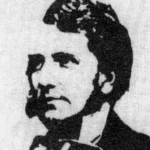 | |
The Bridal of Carrigvarah | |
| Author | Joseph Sheridan Le Fanu |
|---|---|
| Published |
1839
|
| Language | English |
| Nationality | Irish |
| Genre | Gothic Fiction, Supernatural |
1839 Short Story
The Bridal of Carrigvarah
The Bridal of Carrigvarah is an English Gothic Fiction, Supernatural short story by Irish writer Joseph Sheridan Le Fanu. It was first published in 1839.
The Bridal of Carrigvarah
by Joseph Sheridan Le Fanu
Being a Sixth Extract from the Legacy of the late Francis Purcell, P. P. of Drumcoolagh.
In a sequestered district of the county of Limerick, there stood my early life, some forty years ago, one of those strong stone buildings, half castle, half farm-house, which are not unfrequent in the South of Ireland, and whose solid masonry and massive construction seem to prove at once the insecurity and the caution of the Cromwellite settlers who erected them. At the time of which I speak, this building was tenanted by an elderly man, whose starch and puritanic mien and manners might have become the morose preaching parliamentarian captain, who had raised the house and ruled the household more than a hundred years before; but this man, though Protestant by descent as by name, was not so in religion; he was a strict, and in outward observances, an exemplary Catholic; his father had returned in early youth to the true faith, and died in the bosom of the church.
Martin Heathcote was, at the time of which I speak, a widower, but his house-keeping was not on that account altogether solitary, for he had a daughter, whose age was now sufficiently advanced to warrant her father in imposing upon her the grave duties of domestic superintendence.
This little establishment was perfectly isolated, and very little intruded upon by acts of neighbourhood; for the rank of its occupants was of that equivocal kind which precludes all familiar association with those of a decidedly inferior rank, while it is not sufficient to entitle its possessors to the society of established gentility, among whom the nearest residents were the O’Maras of Carrigvarah, whose mansion-house, constructed out of the ruins of an old abbey, whose towers and cloisters had been levelled by the shot of Cromwell’s artillery, stood not half a mile lower upon the river banks.
Colonel O’Mara, the possessor of the estates, was then in a declining state of health, and absent with his lady from the country, leaving at the castle, his son young O’Mara, and a kind of humble companion, named Edward Dwyer, who, if report belied him not, had done in his early days some PECULIAR SERVICES for the Colonel, who had been a gay man perhaps worsebut enough of recapitulation.
It was in the autumn of the year 17 that the events which led to the catastrophe which I have to detail occurred. I shall run through the said recital as briefly as clearness will permit, and leave you to moralise, if such be your mood, upon the story of real life, which I even now trace at this distant period not without emotion.
It was upon a beautiful autumn evening, at that glad period of the season when the harvest yields its abundance, that two figures were seen sauntering along the banks of the winding river, which I described as bounding the farm occupied by Heathcote; they had been, as the rods and landing-nets which they listlessly carried went to show, plying the gentle, but in this case not altogether solitary craft of the fisherman. One of those persons was a tall and singularly handsome young man, whose dark hair and complexion might almost have belonged to a Spaniard, as might also the proud but melancholy expression which gave to his countenance a character which contrasts sadly, but not uninterestingly, with extreme youth; his air, as he spoke with his companion, was marked by that careless familiarity which denotes a conscious superiority of one kind or other, or which may be construed into a species of contempt; his comrade afforded to him in every respect a striking contrast. He was rather low in staturea defect which was enhanced by a broad and square-built figurehis face was sallow, and his features had that prominence and sharpness which frequently accompany personal deformitya remarkably wide mouth, with teeth white as the fangs of a wolf, and a pair of quick, dark eyes, whose effect was heightened by the shadow of a heavy black brow, gave to his face a power of expression, particularly when sarcastic or malignant emotions were to be exhibited, which features regularly handsome could scarcely have possessed.
‘Well, sir,’ said the latter personage, ‘I have lived in hall and abbey, town and country, here and abroad for forty years and more, and should know a thing or two, and as I am a living man, I swear I think the girl loves you.’
‘You are a fool, Ned,’ said the younger.
‘I may be a fool,’ replied the first speaker, ‘in matters where my own advantage is staked, but my eye is keen enough to see through the flimsy disguise of a country damsel at a glance; and I tell you, as surely as I hold this rod, the girl loves you.’
‘Oh I this is downright headstrong folly,’ replied the young fisherman. ‘Why, Ned, you try to persuade me against my reason, that the event which is most to be deprecated has actually occurred. She is, no doubt, a pretty girla beautiful girlbut I have not lost my heart to her; and why should I wish her to be in love with me? Tush, man, the days of romance are gone, and a young gentleman may talk, and walk, and laugh with a pretty country maiden, and never breathe aspirations, or vows, or sighs about the matter; unequal matches are much oftener read of than made, and the man who could, even in thought, conceive a wish against the honour of an unsuspecting, artless girl, is a villain, for whom hanging is too good.’
This concluding sentence was uttered with an animation and excitement, which the mere announcement of an abstract moral sentiment could hardly account for.
‘You are, then, indifferent, honestly and in sober earnest, indifferent to the girl?’ inquired Dwyer.
‘Altogether so,’ was the reply.
‘Then I have a request to make,’ continued Dwyer, ‘and I may as well urge it now as at any other time. I have been for nearly twenty years the faithful, and by no means useless, servant of your family; you know that I have rendered your father critical and important services’ he paused, and added hastily: ‘you are not in the moodI tire you, sir.’
‘Nay,’ cried O’Mara, ‘I listen patiently proceed.’
‘For all these services, and they were not, as I have said, few or valueless, I have received little more reward than liberal promises; you have told me often that this should be mendedI’ll make it easily doneI’m not unreasonableI should be contented to hold Heathcote’s ground, along with this small farm on which we stand, as full quittance of all obligations and promises between us.’
‘But how the devil can I effect that for you; this farm, it is true, I, or my father, rather, may lease to you, but Heathcote’s title we cannot impugn; and even if we could, you would not expect us to ruin an honest man, in order to make way for YOU, Ned.’
‘What I am,’ replied Dwyer, with the calmness of one who is so accustomed to contemptuous insinuations as to receive them with perfect indifference, ‘is to be attributed to my devotedness to your honourable familybut that is neither here nor there. I do not ask you to displace Heathcote, in order to made room for me. I know it is out of your power to do so. Now hearken to me for a moment; Heathcote’s property, that which he has set out to tenants, is worth, say in rents, at most, one hundred pounds: half of this yearly amount is assigned to your father, until payment be made of a bond for a thousand pounds, with interest and soforth. Hear me patiently for a moment and I have done. Now go you to Heathcote, and tell him your father will burn the bond, and cancel the debt, upon one conditionthat when I am in possession of this farm, which you can lease to me on what terms you think suitable, he will convey over his property to me, reserving what life-interest may appear fair, I engaging at the same time to marry his daughter, and make such settlements upon her as shall be thought fittinghe is not a foolthe man will close with the offer.’
O’Mara turned shortly upon Dwyer, and gazed upon him for a moment with an expression of almost unmixed resentment.
‘How,’ said he at length, ‘YOU contract to marry Ellen Heathcote? the poor, innocent, confiding, light-hearted girl. No, no, Edward Dwyer, I know you too well for thatyour services, be they what they will, must not, shall not go unrewarded your avarice shall be appeased but not with a human sacrifice! Dwyer, I speak to you without disguise; you know me to be acquainted with your history, and what’s more, with your character. Now tell me frankly, were I to do as you desire me, in cool blood, should I not prove myself a more uncompromising and unfeeling villain than humanity even in its most monstrous shapes has ever yet given birth to?’
Dwyer met this impetuous language with the unmoved and impenetrable calmness which always marked him when excitement would have appeared in others; he even smiled as he replied: (and Dwyer’s smile, for I have seen it, was characteristically of that unfortunate kind which implies, as regards the emotions of others, not sympathy but derision).
‘This eloquence goes to prove Ellen Heathcote something nearer to your heart than your great indifference would have led me to suppose.’
There was something in the tone, perhaps in the truth of the insinuation, which at once kindled the quick pride and the anger of O’Mara, and he instantly replied:
‘Be silent, sir, this is insolent folly.’
Whether it was that Dwyer was more keenly interested in the success of his suit, or more deeply disappointed at its failure than he cared to express, or that he was in a less complacent mood than was his wont, it is certain that his countenance expressed more emotion at this direct insult than it had ever exhibited before under similar circumstances; for his eyes gleamed for an instant with savage and undisguised ferocity upon the young man, and a dark glow crossed his brow, and for the moment he looked about to spring at the throat of his insolent patron; but the impulse whatever it might be, was quickly suppressed, and before O’Mara had time to detect the scowl, it had vanished.
‘Nay, sir,’ said Dwyer, ‘I meant no offence, and I will take none, at your hands at least. I will confess I care not, in love and soforth, a single bean for the girl; she was the mere channel through which her father’s wealth, if such a pittance deserves the name, was to have flowed into my possession’twas in respect of your family finances the most economical provision for myself which I could devisea matter in which you, not I, are interested. As for women, they are all pretty much alike to me. I am too old myself to make nice distinctions, and too ugly to succeed by Cupid’s arts; and when a man despairs of success, he soon ceases to care for it. So, if you know me, as you profess to do, rest satisfied “caeteris paribus;” the money part of the transaction being equally advantageous, I should regret the loss of Ellen Heathcote just as little as I should the escape of a minnow from my landing-net.’
They walked on for a few minutes in silence, which was not broken till Dwyer, who had climbed a stile in order to pass a low stone wall which lay in their way, exclaimed:
‘By the rood, she’s herehow like a philosopher you look.”
The conscious blood mounted to O’Mara’s cheek; he crossed the stile, and, separated from him only by a slight fence and a gate, stood the subject of their recent and somewhat angry discussion.
‘God save you, Miss Heathcote,’ cried Dwyer, approaching the gate.
The salutation was cheerfully returned, and before anything more could pass, O’Mara had joined the party.
My friend, that you may understand the strength and depth of those impetuous passions, that you may account for the fatal infatuation which led to the catastrophe which I have to relate, I must tell you, that though I have seen the beauties of cities and of courts, with all the splendour of studied ornament about them to enhance their graces, possessing charms which had made them known almost throughout the world, and worshipped with the incense of a thousand votaries, yet never, nowhere did I behold a being of such exquisite and touching beauty, as that possessed by the creature of whom I have just spoken. At the moment of which I write, she was standing near the gate, close to which several brown-armed, rosy-cheeked damsels were engaged in milking the peaceful cows, who stood picturesquely grouped together. She had just thrown back the hood which is the graceful characteristic of the Irish girl’s attire, so that her small and classic head was quite uncovered, save only by the dark-brown hair, which with graceful simplicity was parted above her forehead. There was nothing to shade the clearness of her beautiful complexion; the delicately-formed features, so exquisite when taken singly, so indescribable when combined, so purely artless, yet so meet for all expression. She was a thing so very beautiful, you could not look on her without feeling your heart touched as by sweet music. Whose lightest action was a gracewhose lightest word a spellno limner’s art, though ne’er so perfect, could shadow forth her beauty; and do I dare with feeble words try to make you see it? Providence is indeed no respecter of persons, its blessings and its inflictions are apportioned with an undistinguishing hand, and until the race is over, and life be done, none can know whether those perfections, which seemed its goodliest gifts, many not prove its most fatal; but enough of this.
Dwyer strolled carelessly onward by the banks of the stream, leaving his young companion leaning over the gate in close and interesting parlance with Ellen Heathcote; as he moved on, he half thought, half uttered words to this effect:
‘Insolent young spawn of ingratitude and guilt, how long must I submit to be trod upon thus; and yet why should I murmurhis day is even now declining and if I live a year, I shall see the darkness cover him and his for ever. Scarce half his broad estates shall save himbut I must waitI am but a pauper nowa beggar’s accusation is always a libelthey must reward me soonand were I independent once, I’d make them feel my power, and feel it SO, that I should die the richest or the best avenged servant of a great man that has ever been heard of yes, I must waitI must make sure of something at leastI must be able to stand by myselfand thenand then’ He clutched his fingers together, as if in the act of strangling the object of his hatred. ‘But one thing shall save him but one thing onlyhe shall pay me my own priceand if he acts liberally, as no doubt he will do, upon compulsion, why he saves his reputationperhaps his neck the insolent young whelp yonder would speak in an humbler key if he but knew his father’s jeopardybut all in good time.’
He now stood upon the long, steep, narrow bridge, which crossed the river close to Carrigvarah, the family mansion of the O’Maras; he looked back in the direction in which he had left his companion, and leaning upon the battlement, he ruminated long and moodily. At length he raised himself and said:
‘He loves the girl, and WILL love her moreI have an opportunity of winning favour, of doing service, which shall bind him to me; yes, he shall have the girl, if I have art to compass the matter. I must think upon it.’
He entered the avenue and was soon lost in the distance.
Days and weeks passed on, and young O’Mara daily took his rod and net, and rambled up the river; and scarce twelve hours elapsed in which some of those accidents, which invariably bring lovers together, did not secure him a meeting of longer or shorter duration, with the beautiful girl whom he so fatally loved.
One evening, after a long interview with her, in which he had been almost irresistibly prompted to declare his love, and had all but yielded himself up to the passionate impulse, upon his arrival at home he found a letter on the table awaiting his return; it was from his father to the following effect:
- ‘To Richard O’Mara.
- ‘September, 17, Lm, England.
- ‘MY DEAR SON,
- ‘I have just had a severe attack of my old and almost forgotten enemy, the gout. This I regard as a good sign; the doctors telling me that it is the safest development of peccant humours; and I think my chest is less tormenting and oppressed than I have known it for some years. My chief reason for writing to you now, as I do it not without difficulty, is to let you know my pleasure in certain matters, in which I suspect some shameful, and, indeed, infatuated neglect on your part, “quem perdere vult deus prius dementat:” how comes it that you have neglected to write to Lady Emily or any of that family? the understood relation subsisting between you is one of extreme delicacy, and which calls for marked and courteous, nay, devoted attention upon your side. Lord is already offended; beware what you do; for as you will find, if this match be lost by your fault or folly, by I will cut you off with a shilling. I am not in the habit of using threats when I do not mean to fulfil them, and that you well know; however I do not think you have much real cause for alarm in this case. Lady Emily, who, by the way, looks if possible more charming than ever, is anything but hard-hearted, at least when YOU solicit; but do as I desire, and lose no time in making what excuse you may, and let me hear from you when you can fix a time to join me and your mother here.
- ‘Your sincere well-wisher and father,
-
- ‘RICHARD O’MARA.’
-
- ‘Your sincere well-wisher and father,
In this letter was inclosed a smaller one, directed to Dwyer, and containing a cheque for twelve pounds, with the following words:
- ‘Make use of the enclosed, and let me hear if Richard is upon any wild scheme at present: I am uneasy about him, and not without reason; report to me speedily the result of your vigilance.
-
-
- ‘R. O’MARA.’
-
-
Dwyer just glanced through this brief, but not unwelcome, epistle; and deposited it and its contents in the secret recesses of his breeches pocket, and then fixed his eyes upon the face of his companion, who sat opposite, utterly absorbed in the perusal of his father’s letter, which he read again and again, pausing and muttering between whiles, and apparently lost in no very pleasing reflections. At length he very abruptly exclaimed:
‘A delicate epistle, trulyand a politic would that my tongue had been burned through before I assented to that doubly-cursed contract. Why, I am not pledged yetI am not; there is neither writing, nor troth, nor word of honour, passed between us. My father has no right to pledge me, even though I told him I liked the girl, and would wish the match. ‘Tis not enough that my father offers her my heart and hand; he has no right to do it; a delicate woman would not accept professions made by proxy. Lady Emily! Lady Emily! with all the tawdry frippery, and finery of dress and demeanourcompare HER with Pshaw! Ridiculous! How blind, how idiotic I have been.’
He relapsed into moody reflections, which Dwyer did not care to disturb, and some ten minutes might have passed before he spoke again. When he did, it was in the calm tone of one who has irrevocably resolved upon some decided and important act.
‘Dwyer,’ he said, rising and approaching that person, ‘whatever god or demon told you, even before my own heart knew it, that I loved Ellen Heathcote, spoke truth. I love her madlyI never dreamed till now how fervently, how irrevocably, I am hershow dead to me all other interests are. Dwyer, I know something of your disposition, and you no doubt think it strange that I should tell to you, of all persons, SUCH a secret; but whatever be your faults, I think you are attached to our family. I am satisfied you will not betray me. I know’
‘Pardon me,’ said Dwyer, ‘if I say that great professions of confidence too frequently mark distrust. I have no possible motive to induce me to betray you; on the contrary, I would gladly assist and direct whatever plans you may have formed. Command me as you please; I have said enough.’
‘I will not doubt you, Dwyer,’ said O’Mara; ‘ I have taken my resolutionI have, I think, firmness to act up to it. To marry Ellen Heathcote, situated as I am, were madness; to propose anything else were worse, were villainy not to be named. I will leave the country to-morrow, cost what pain it may, for England. I will at once break off the proposed alliance with Lady Emily, and will wait until I am my own master, to open my heart to Ellen. My father may say and do what he likes; but his passion will not last. He will forgive me; and even were he to disinherit me, as he threatens, there is some property which must descend to me, which his will cannot affect. He cannot ruin my interests; he SHALL NOT ruin my happiness. Dwyer, give me pen and ink; I will write this moment.’
This bold plan of proceeding for many reasons appeared inexpedient to Dwyer, and he determined not to consent to its adoption without a struggle.
‘I commend your prudence,’ said he, ‘in determining to remove yourself from the fascinating influence which has so long bound you here; but beware of offending your father. Colonel O’Mara is not a man to forgive an act of deliberate disobedience, and surely you are not mad enough to ruin yourself with him by offering an outrageous insult to Lady Emily and to her family in her person; therefore you must not break off the understood contract which subsists between you by any formal act hear me out patiently. You must let Lady Emily perceive, as you easily may, without rudeness or even coldness of manner, that she is perfectly indifferent to you; and when she understands this to be the case, it she possesses either delicacy or spirit, she will herself break off the engagement. Make what delay it is possible to effect; it is very possible that your father, who cannot, in all probability, live many months, may not live as many days if harassed and excited by such scenes as your breaking off your engagement must produce.’
‘Dwyer,’ said O’Mara, ‘I will hear you outproceed.’
‘Besides, sir, remember,’ he continued, ‘the understanding which we have termed an engagement was entered into without any direct sanction upon your part; your father has committed HIMSELF, not YOU, to Lord . Before a real contract can subsist, you must be an assenting party to it. I know of no casuistry subtle enough to involve you in any engagement whatever, without such an ingredient. Tush! you have an easy card to play.’
‘Well,’ said the young man, ‘I will think on what you have said; in the meantime, I will write to my father to announce my immediate departure, in order to join him.’
‘Excuse me,’ said Dwyer, ‘but I would suggest that by hastening your departure you but bring your dangers nearer. While you are in this country a letter now and then keeps everything quiet; but once across the Channel and with the colonel, you must either quarrel with him to your own destruction, or you must dance attendance upon Lady Emily with such assiduity as to commit yourself as completely as if you had been thrice called with her in the parish church. No, no; keep to this side of the Channel as long as you decently can. Besides, your sudden departure must appear suspicious, and will probably excite inquiry. Every good end likely to be accomplished by your absence will be effected as well by your departure for Dublin, where you may remain for three weeks or a month without giving rise to curiosity or doubt of an unpleasant kind; I would therefore advise you strongly to write immediately to the colonel, stating that business has occurred to defer your departure for a month, and you can then leave this place, if you think fit, immediately, that is, within a week or so.’
Young O’Mara was not hard to be persuaded. Perhaps it was that, unacknowledged by himself, any argument which recommended his staying, even for an hour longer than his first decision had announced, in the neighbourhood of Ellen Heathcote, appeared peculiarly cogent and convincing; however this may have been, it is certain that he followed the counsel of his cool-headed follower, who retired that night to bed with the pleasing conviction that he was likely soon to involve his young patron in all the intricacies of disguise and intriguea consummation which would leave him totally at the mercy of the favoured confidant who should possess his secret.
Young O’Mara’s reflections were more agitating and less satisfactory than those of his companion. He resolved upon leaving the country before two days had passed. He felt that he could not fairly seek to involve Ellen Heathcote in his fate by pledge or promise, until he had extricated himself from those trammels which constrained and embarrassed all his actions. His determination was so far prudent; but, alas! he also resolved that it was but right, but necessary, that he should see her before his departure. His leaving the country without a look or a word of parting kindness interchanged, must to her appear an act of cold and heartless caprice; he could not bear the thought.
‘No,’ said he, ‘I am not child enough to say more than prudence tells me ought to say; this cowardly distrust of my firmness I should and will contemn. Besides, why should I commit myself? It is possible the girl may not care for me. No, no; I need not shrink from this interview. I have no reason to doubt my firmness nonenone. I must cease to be governed by impulse. I am involved in rocks and quicksands; and a collected spirit, a quick eye, and a steady hand, alone can pilot me through. God grant me a safe voyage!’
The next day came, and young O’Mara did not take his fishing-rod as usual, but wrote two letters; the one to his father, announcing his intention of departing speedily for England; the other to Lady Emily, containing a cold but courteous apology for his apparent neglect. Both these were despatched to the post-office that evening, and upon the next morning he was to leave the country.
Upon the night of the momentous day of which we have just spoken, Ellen Heathcote glided silently and unperceived from among the busy crowds who were engaged in the gay dissipation furnished by what is in Ireland commonly called a dance (the expenses attendant upon which, music, etc., are defrayed by a subscription of one halfpenny each), and having drawn her mantle closely about her, was proceeding with quick steps to traverse the small field which separated her from her father’s abode. She had not walked many yards when she became aware that a solitary figure, muffled in a cloak, stood in the pathway. It approached; a low voice whispered:
‘Ellen.’
‘Is it you, Master Richard?’ she replied.
He threw back the cloak which had concealed his features.
‘It is I, Ellen, he said; ‘I have been watching for you. I will not delay you long.’
He took her hand, and she did not attempt to withdraw it; for she was too artless to think any evil, too confiding to dread it.
‘Ellen,’ he continued, even now unconsciously departing from the rigid course which prudence had marked out; ‘Ellen, I am going to leave the country; going to-morrow. I have had letters from England. I must go; and the sea will soon be between us.’
He paused, and she was silent.
‘There is one request, one entreaty I have to make,’ he continued; ‘I would, when I am far away, have something to look at which belonged to you. Will you give medo not refuse itone little lock of your beautiful hair?’
With artless alacrity, but with trembling hand, she took the scissors, which in simple fashion hung by her side, and detached one of the long and beautiful locks which parted over her forehead. She placed it in his hand.
Again he took her hand, and twice he attempted to speak in vain; at length he said:
‘Ellen, when I am gonewhen I am awaywill you sometimes remember, sometimes think of me?’
Ellen Heathcote had as much, perhaps more, of what is noble in pride than the haughtiest beauty that ever trod a court; but the effort was useless; the honest struggle was in vain; and she burst into floods of tears, bitterer than she had ever shed before.
I cannot tell how passions rise and fall; I cannot describe the impetuous words of the young lover, as pressing again and again to his lips the cold, passive hand, which had been resigned to him, prudence, caution, doubts, resolutions, all vanished from his view, and melted into nothing. ‘Tis for me to tell the simple fact, that from that brief interview they both departed promised and pledged to each other for ever.
Through the rest of this story events follow one another rapidly.
A few nights after that which I have just mentioned, Ellen Heathcote disappeared; but her father was not left long in suspense as to her fate, for Dwyer, accompanied by one of those mendicant friars who traversed the country then even more commonly than they now do, called upon Heathcote before he had had time to take any active measures for the recovery of his child, and put him in possession of a document which appeared to contain satisfactory evidence of the marriage of Ellen Heathcote with Richard O’Mara, executed upon the evening previous, as the date went to show; and signed by both parties, as well as by Dwyer and a servant of young O’Mara’s, both these having acted as witnesses; and further supported by the signature of Peter Nicholls, a brother of the order of St. Francis, by whom the ceremony had been performed, and whom Heathcote had no difficulty in recognising in the person of his visitant.
This document, and the prompt personal visit of the two men, and above all, the known identity of the Franciscan, satisfied Heathcote as fully as anything short of complete publicity could have done. And his conviction was not a mistaken one.
Dwyer, before he took his leave, impressed upon Heathcote the necessity of keeping the affair so secret as to render it impossible that it should reach Colonel O’Mara’s ears, an event which would have been attended with ruinous consequences to all parties. He refused, also, to permit Heathcote to see his daughter, and even to tell him where she was, until circumstances rendered it safe for him to visit her.
Heathcote was a harsh and sullen man; and though his temper was anything but tractable, there was so much to please, almost to dazzle him, in the event, that he accepted the terms which Dwyer imposed upon him without any further token of disapprobation than a shake of the head, and a gruff wish that ‘it might prove all for the best.’
Nearly two months had passed, and young O’Mara had not yet departed for England. His letters had been strangely few and far between; and in short, his conduct was such as to induce Colonel O’Mara to hasten his return to Ireland, and at the same time to press an engagement, which Lord , his son Captain N, and Lady Emily had made to spend some weeks with him at his residence in Dublin.
A letter arrived for young O’Mara, stating the arrangement, and requiring his attendance in Dublin, which was accordingly immediately afforded.
He arrived, with Dwyer, in time to welcome his father and his distinguished guests. He resolved to break off his embarrassing connection with Lady Emily, without, however, stating the real motive, which he felt would exasperate the resentment which his father and Lord would no doubt feel at his conduct.
He strongly felt how dishonourably he would act if, in obedience to Dwyer’s advice, he seemed tacitly to acquiesce in an engagement which it was impossible for him to fulfil. He knew that Lady Emily was not capable of anything like strong attachment; and that even if she were, he had no reason whatever to suppose that she cared at all for him.
He had not at any time desired the alliance; nor had he any reason to suppose the young lady in any degree less indifferent. He regarded it now, and not without some appearance of justice, as nothing more than a kind of understood stipulation, entered into by their parents, and to be considered rather as a matter of business and calculation than as involving a







